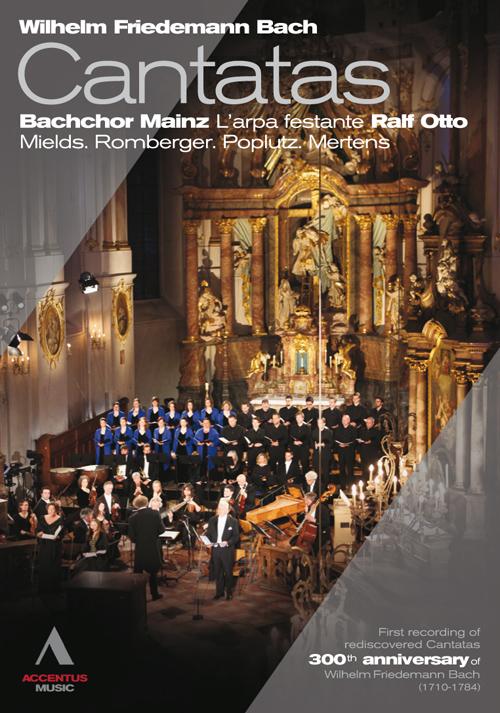BACH, W.F.: Cantatas (L'arpa festante, Otto) (NTSC)
Lucia di Lammermoor
Teatro Carlo Felice di Genova 2003
Orchestra and Chorus of the Teatro Carlo Felice di Genova, Patrick Fournillier
Picture Format: 16:9 Anamorph
Sound Format: LPCM stereo, Dolby Digital 5.1, DTS 5.1
Running Time: 145 Mins
Region Code: PAL All
Booklet Languages: GB, F, D
Recording Date: June 2003
Cat no.: DV-OPLDIL
A stark, emotive performance of Donizetti's tragic opera, created by visionary director Graham Vick.
In the superb setting of Genoa's Teatro Carlo Felice, Graham Vick chooses to employ the simplest staging to create spaces representing the atmosphere of the scenes rather than physical sets, focusing as closely as possible on the passionate relationship of Lucia, Edgardo and Enrico.
Stefania Bonfadelli features here as the tragic heroine. Her performance alongside Placido Domingo in Zeffirelli's 2002 production of La Traviata won her rave reviews with MusicWeb describing her performance as "outstanding", while Argentinean-born Marcelo Alvarez was acclaimed by the Independent as "one of today's finest lyric tenors" when he appeared in Lucia di Lammermoor at the Royal Opera House at the end of 2003.
Graham Vick is the founder and artistic director of Birmingham Opera Company. Under his leadership it has developed into one of the most innovative opera companies in the world, with Vick's revolutionary approach to opera and attempts to bring the art form to a wider audience garnering significant domestic and international attention and awards:
"Once again, though, the most inspiring opera performance came from
Graham Vick's Birmingham Opera Company, whose staging of Bernstein's Candide,
in a disused car factory with a predominantly amateur cast of hundreds, was
in its own way completely unforgettable." The Guardian, Classical
Review of the Year 2003
CAST
| Lucia | Stefania Bonfadelli |
| Edgardo | Marcelo Alvarez |
| Enrico | Roberto Frontali |
| Raimondo | Mirco Palazzi |
| Arturo | Cristiano Olivieri |
| Normanno | Giovanni Maini |
| Alisa | Maria Castelli |

For the conductor Ralf Otto flexibility, diversity and transparency of sound have always been essential for his work with orchestras and choirs. Otto believes that understanding the compositional structure of a piece of music is an indispensable prerequisite to achieving intensely emotional expression. The conductor’s reputation is based on his gift for interpreting different musical styles, from the Renaissance to the music of today. Since the beginning of his career, he has been a strong advocate for the performance of early music according to historically informed performance practices. In 1981, Otto founded the Frankfurter Vokalensemble, with whom his main focus was contemporary music.
Otto’s repertoire encompasses Monteverdi, the complete works of Bach, essential works from the Baroque period, the Viennese classics, the Romantic period, Britten, Eisler, Schoenberg and Dallapiccola as well as contemporary composers. Driven by his avid interest in as yet unheard music, Ralf Otto focusses on rediscovering forgotten compositions by composers such as Wilhelm Friedemann Bach, as well as contemporary works. His numerous recordings and broadcasts are a testament to his artistic achievements.

The eldest son of Johann Sebastian Bach, Wilhelm Friedemann was born in 1710 in Weimar and was taught by his father, after 1723, when the family moved to Leipzig, becoming a pupil at the Thomasschule. He spent four years at the University of Leipzig, before finding employment as organist at the Sophienkirche in Dresden and subsequently, with unhappy results, at the Liebfrauenkirche in Halle. From 1764 until his death twenty years later he held no official position, although he had been widely recognised as one of the most distinguished organists of his time and had mastered very thoroughly the lessons taught him by his father. His own tendency to the freedom of thought of the Enlightenment had not endeared him to his Pietist superiors in Halle and independence of character rendered him gradually less employable, within the restrictive circumstances of his time.
Keyboard Music
W.F. Bach wrote a number of harpsichord sonatas, fantasias and shorter dance pieces. His contrapuntal command was shown in a series of fugues that also reflect something of his known distinction in organ improvisation. His Concerto for two harpsichords combines the Baroque and the newly developing classical style of his time.
Orchestral Music
Bach left a number of harpsichord concertos and sinfonias.
Chamber Music
Chamber music by W.F. Bach includes a set of flute duets and trio sonatas.
Church Music
The exigencies of his employment led Bach to the composition of a number of church cantatas.































